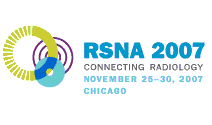
Abstract Archives of the RSNA, 2007
Lisa M. Jongen MD, Presenter: Nothing to Disclose
Annet Waaijer MD, Abstract Co-Author: Nothing to Disclose
Jeroen Hendrikse MD, PhD, Abstract Co-Author: Nothing to Disclose
H. Bart van der Worp MD, PhD, Abstract Co-Author: Nothing to Disclose
Rob Lo MD, Abstract Co-Author: Nothing to Disclose
Willem P. Mali MD, PhD, Abstract Co-Author: Nothing to Disclose
Mathias Prokop MD, Abstract Co-Author: Medical Board, Koninklijke Philips Electronics NV
et al, Abstract Co-Author: Nothing to Disclose
et al, Abstract Co-Author: Nothing to Disclose
To examine the relation between early in-stent lesions at one month and restenosis after one year in patients stented for symptomatic carotid artery stenosis.
We included 53 consecutive patients with symptomatic carotid artery stenosis who were treated with carotid artery stenting. Patients underwent multi-detector row computed tomography angiography (CTA) at one month for the morphologic evaluation of the stent, and duplex ultrasonography at one year for detection of restenosis. Early in-stent lesions were defined as a hypodense lesion at the stent wall between struts and in-stent lumen; significant restenosis was defined as a peak systolic velocity (PSV) > 240 cm/s. A t-test was used to asses the relation between in-stent lesions and PSV.
At one month, 8 patients (15%) were found to have non-occlusive in-stent lesions; in one patient (2%) the stent was occluded. At one year, no restenosis was found, irrespective of whether patients had no lesion or a non-occlusive in-stent lesion at one month. The mean PSV at one year did not differ significantly between patients with non-occlusive early in-stent lesions (86 ± 39 cm/s) and without lesions (106 ± 47 cm/s; p = 0.263).
Non-occlusive early in-stent lesions one month after stent placement are found in 15% of patients after carotid artery stenting but appear not related to restenosis at 1-year follow-up.
In-stent lesions found with CTA at one month after carotid artery stenting appear to have no influence on long-term patency of carotid artery stents.
Jongen, L,
Waaijer, A,
Hendrikse, J,
van der Worp, H,
Lo, R,
Mali, W,
Prokop, M,
et al, ,
et al, ,
Early In-stent Lesions after Carotid Artery Stenting Are Not Related to In-stent Restenosis at 1 Year. Radiological Society of North America 2007 Scientific Assembly and Annual Meeting, November 25 - November 30, 2007 ,Chicago IL.
http://archive.rsna.org/2007/5010320.html

